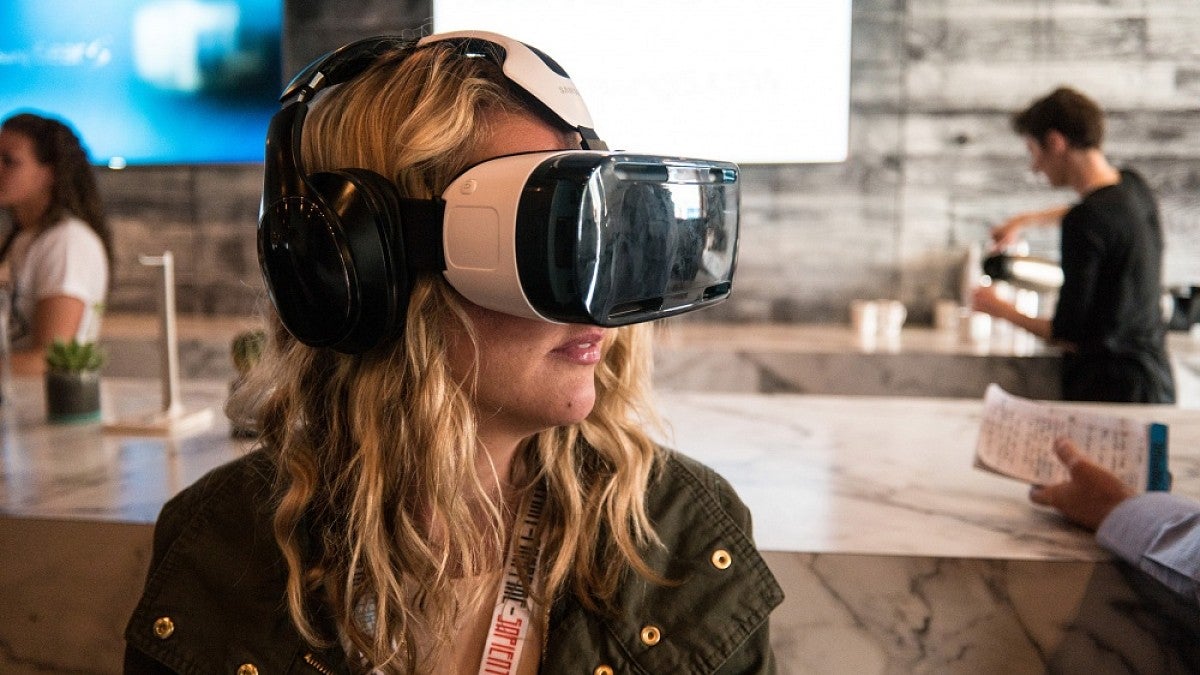With the pandemic still limiting personal contact, people strive to stay connected with friends and family by turning to virtual platforms like Zoom, Skype and social media to stave off isolation and loneliness.
But what about virtual reality?
The next level in virtual togetherness, according to two research papers recently published by a team of School of Journalism and Communication faculty members, may be virtual reality technology — if the cost comes down enough to be more widely accessible.
“VR, or virtual reality, is a place to explore and create the unimaginable,” said associate professor Donna Davis, director of the strategic communication master's program.
The first paper, which has been two years in the making, was written by Davis and assistant professors Maxwell Foxman and David Markowitz. In the paper, they compare how virtual reality is framed in both academia and popular culture.
The authors argue that a more common understanding of how to measure and communicate about empathy is needed because of major gaps in public and academic perceptions of how VR can address such topics.
“In the press, virtual reality was touted, particularly from 2016 through 2018, as being this kind of empathy machine,” Foxman said. “You put on a headset and you could walk in the shoes of another person, and that would make you empathize with their experience.”
While people have been curious about the potential benefits virtual reality offers, it’s often associated with single-player gaming. With headsets ranging from $300 to more than $1,000, it’s also inaccessible to most people.
Assistant professor Daniel Pimentel joined Davis, Foxman and Markowitz to write a second paper exploring the limits and potential of virtual reality during the COVID-19 pandemic.
Virtual reality is often used for entertainment, but it can be a mental health tool as well. For example, people with anxiety, depression and post-traumatic stress disorder can use virtual reality to practice mindfulness or meditation in a relaxing environment they usually wouldn’t have access to, such as on a beach in New Zealand or a hike in the Redwood National Forest in California.
“One of the big issues we outlined in the paper is the idea that during the pandemic, we were very isolated,” Pimentel said. “Virtual reality is particularly interesting because it gives you that illusion of being close to other people, or social presence, that are otherwise not next to you.”
The second paper focuses on five primary themes that will continue to influence adoption of virtual reality technology during the pandemic: sociocultural, content, affordability, supply chain and equitable design.
“The problem with headset-based virtual reality, as we discussed in both of our papers, is the technology is still evolving,” Davis said. “Headsets are still expensive — a $300 headset used to maybe cost $30,000. The technology it takes to also run the software is a higher-end computer, which automatically eliminates a large majority of the population.”
Pimentel, who started at the School of Journalism and Communication’s Portland campus in September, was able to get to know his colleagues a little more by working over Zoom with them on the paper. The team worked to combine their individual expertise with virtual reality technology to write engaging and unique papers meant to help ensure VR is accessible for people who want to use it.
VR provides an unprecedented amount of nonverbal data, like posture that can be used to tailor experiences to meet the needs of each individual. However, ethically collecting and using that data does come with risks.
“The COVID-19 pandemic has given us the opportunity to dive into these technologies,” Davis said. “With all the promise, we also recognize there are risks involved that must be mitigated. As researchers, we need to be aware of what those are and how to help industry, researchers and consumers prepare for them. I believe that people are going to discover virtual reality to be an incredibly powerful tool.”
—By Alli Weseman, School of Journalism and Communication


